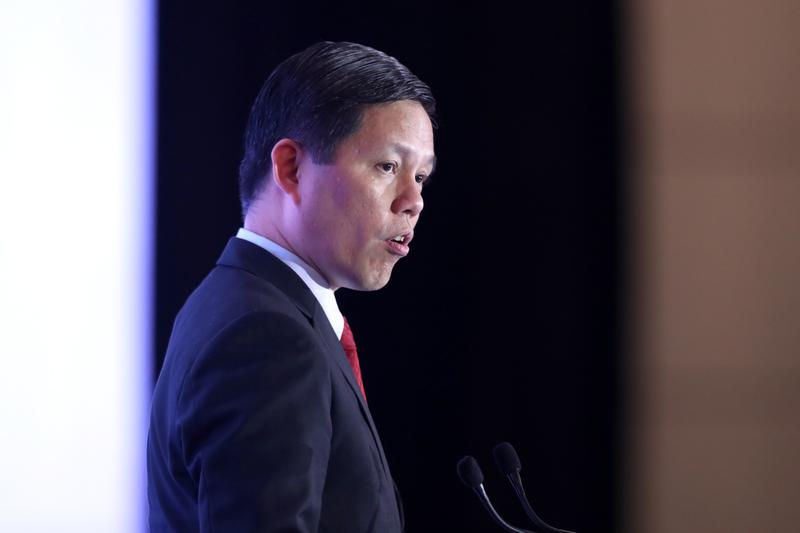 Chan Chun Sing, Singapore's minister of trade and industry, speaks during the Singapore-China (Chongqing) Economic and Trade Cooperation Forum in Singapore on Sept 11, 2019. (PHOTO / BLOOMBERG)
Chan Chun Sing, Singapore's minister of trade and industry, speaks during the Singapore-China (Chongqing) Economic and Trade Cooperation Forum in Singapore on Sept 11, 2019. (PHOTO / BLOOMBERG)
There’s “not much time” left for Singapore’s government to hold its next general election as the city-state has to dissolve parliament in January, months ahead of an April deadline, Minister for Trade and Industry Chan Chun Sing said on Wednesday.
“A lot of people think that we have all the time in the world until next April to call the election,” he said following an interview with Bloomberg TV. “That’s technically correct, but what people do not remember is that parliament will be dissolved in January because parliament has to be dissolved five years after the first sitting for this term of government.”
A lot of people think that we have all the time in the world until next April to call the election ... but what people do not remember is that parliament will be dissolved in January ...
Chan Chun Sing, Minister for trade and industry, Singapore
Coming up against a hard deadline to hold elections, there’s actually “not much time”, Chan said. “We would like, when the opportunity arises, to have a strong mandate because the challenges that we are going to face in the coming years will indeed be the challenge of an entire generation.”
ALSO READ: Singapore says not ruling out holding election over virus
With more than 29,000 confirmed cases of COVID-19 since the pandemic began, the tiny island nation has one of the highest infection rates in Asia. More than 90 percent of the cases are among low-wage migrant workers living in cramped dormitories, and the outbreak there has posed a challenge to a national virus response that was lauded during the early months of the outbreak when the cases were below a thousand.
On Tuesday, Singapore announced that it will reopen more businesses as the number of new infections within the community has come down significantly while the situation in the dormitories has stabilized. Following a partial lockdown that was imposed early last month, restrictions will be eased in three phases, the last of which would be in place until a vaccine is discovered or the disease is deemed non-threatening.
Long-term performance
Whether this economic reopening plan will still be in place when elections occur is unclear.
When the time to vote does come, Chan thinks Singaporeans “are wise enough to look at the government performance not just on an episodic event”, but how it has done in the long term.
READ MORE: Singapore election nears with release of boundaries report
The People’s Action Party has been in power since Singapore’s independence in 1965. Still popular, the party took the vast majority of seats in parliament during the last elections in 2015. With an opposition that’s trying to gain traction, it’s unlikely the ruling party would lose in the next vote.
Earlier this month, parliament passed a “special arrangements” bill that includes new measures to ensure the safety of voters and candidates during an election that may have to be held amid the coronavirus pandemic. They include allowing voters under COVID-19 stay home notice orders to cast their ballot outside their electoral divisions, and also give aspiring candidates the power to authorize a representative to file nomination papers on their behalf.
It’s not so much whether “we are in a crisis or not, but how we get through a crisis and emerge stronger,” said Chan. “That would be how we will go to the polls and I think that will be how Singaporeans will judge us over all these years.”


